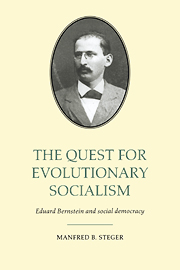Epilogue: evolutionary socialism at the “end of socialism”
Published online by Cambridge University Press: 06 October 2009
Summary
Before exploring the contemporary relevance of Bernstein's evolutionary socialism we first ought to pose the more fundamental question: “What's left of any socialism?” As we approach the millenium, it would appear that the “socialist century” is, irrevocably, over. Soviet communism has collapsed, Third World variants of Marxism-Leninism are on the wane, and the once-so-admired systems of European social democracy are seemingly exhausted. Previously dominating an OECD world based on a national manufacturing industry, the social democratic–Keynesian welfare state of Willy Brandt, François Mitterand, Bruno Kreisky, and Olof Palme has given way to the harsh realities of our post-industrial, globally integrated capitalism. Edging toward the limits of an effective “national control” of the production process, social democrats find the rules of the economic game fundamentally changed. The fiery debates of the 1970s over the implementation of a nationally based, social democratic “Third Way” – or even “Eurocommunism” – have given way to a subdued acknowledgment of the inevitability of a corporate “internationalism” with neo-classical imperatives demanding the cut-back of entitlement programs, the deregulation of markets, and effective wage controls combined with significant tax cuts for business.
These developments, combined with the fall of Soviet communism, have prompted many conservative commentators to herald the “end of socialism” as such, rejoicing in claims of the “fulfillment of history” in liberal capitalism, preferably that of the American persuasion.
- Type
- Chapter
- Information
- The Quest for Evolutionary SocialismEduard Bernstein and Social Democracy, pp. 253 - 260Publisher: Cambridge University PressPrint publication year: 1997



